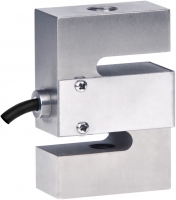How is a load cell constructed?
The so-called spring body of the load cell is made of steel or aluminum. Because these materials are particularly hard-wearing. They offer very good protection against external influences in many situations and working environments.
The DMS (strain gauges) are also installed inside. There are also electrical conductors that are placed on a foil at this point. This is placed on the spring body to be able to transmit the signals.
How does a load cell work?
The way a load cell works is based on a simple principle. Here the mechanical deformation due to a load effect is examined.
In the first step, the load cell is installed in a weighing device. Where this happens depends entirely on the shape of the scale. For example, a Platform load cell installed under a platform.
The weighing object is then moved or placed onto the platform. The load cell or spring body installed underneath is deformed by the force on the platform. The extent of the deformation therefore depends on the force applied. The deformation of the spring body is precisely recorded by the strain gauges. The strain gauges offer an extremely high measurement accuracy. The detected deformation is then forwarded to the evaluation electronics and output there as an electrical signal.
The basic principle of operation is the same for all strain gauge load cells. The structure of the individual cells and the integration into the weighing system can be different. We would be happy to advise you to find out which requirements the load cells have to meet for your project.
Where is a load cell used?
There is no industry that does not use load cells. Accordingly, they are suitable for all types of scales. The load cells find a use in almost every scale:
• Industrial scales of all kinds
• Floor Scales
? Counting Scales
• logistic scales
• Mobile Scales
• Agricultural scales
What is the accuracy of load cells?
Load cells work by different mechanisms. Depending on the type of load cell, they fall into a different accuracy class. For this purpose, load cells are divided into four Accuracy classes subdivided:
• Class A - suitable for fine scales with little to no deviation
• class B - suitable for precision scales
• Class C -; suitable for commercial scales
• Class D -; suitable for coarse scales with a slightly higher deviation
Many factors determine which accuracy class is relevant for your application. Our scale components always convince with a very high weighing accuracy and can therefore be universally integrated.
Buy load cells from the manufacturer bosche.eu
With bosche.eu you are relying on a weighing component manufacturer who has more than 20 years of experience in weighing scales to offer. We offer professional service according to DIN ISO as well as high quality for all components. We know how important precise measuring instruments are and therefore offer you premium products in this area.
The load cells are available with different nominal loads and in protection class IP65. In an individual consultation we find out which components you need. If necessary, the load cells can also be adapted to your specifications.
Order load cells according to your specifications now!








